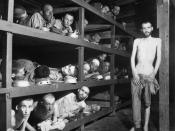Primo Levi's book 'If This Is a Man' is a novel about a German concentration camp, one among many novels on the same subject. However, this book is exceptional as Levi never 'raises his voice, complains, or attributes blame'. 'If This Is a Man' is an objective story told in a detached tone using scientific language, which sometimes makes this book not a confession but an analysis. Nevertheless, distant tone and unemotional language bring the horrifying message across with even greater impact on readers.
The saddest, the most powerful, and the most ironic chapter of the book is the central ninth chapter, called 'The Drowned and the Saved'. Here the author's talent as well as his training as chemist comes through in unique manner. Instead of telling the story, Levi analyses the reasons, the methods, and the effects of German concentration camps. The result is more like an essay or even lab report rather than a part of a novel.
The diction of the chapter is sharply contrasted with its content, emphasizing the terrifying events described.
Already the first sentence of the chapter ("What we have so far said and will say concerns the ambiguous life of the Lager." P. 102) reveals a lot. This sentence is the first step in building up the emotionless tone through technical diction. The first person point of view used throughout previous chapters is suddenly replaced by the pronoun "we" as it is used in official documents. With every following sentence, the dryness of expression grows gradually: "To this question we feel that we have to reply in the affirmative." (p. 102), "...the Lager was presumably a gigantic biological and social experiment." (p. 102), "But another fact seems to us worthy of attention..." (p. 103).
The impact of language is reinforced...



Very informative!
This paper was very interesting and informative. I learned a lot by reading it.
2 out of 4 people found this comment useful.